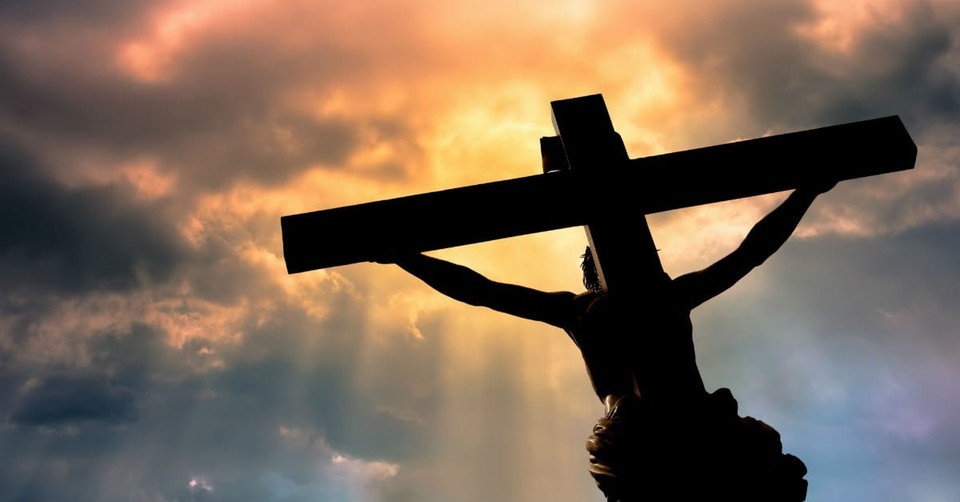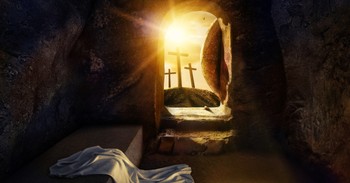Christians believe that the words “He was pierced for our transgressions” from Isaiah 53:5 foreshadow God’s plan for the redemption of His children through Jesus. Believers’ thoughts are focused on Christ’s crucifixion and resurrection at Easter, but any time we think about sin, we remember why Christ had to die for us—and the agony He suffered when He was nailed to the cross.
What Is the Biblical Definition of Transgression or Iniquity?
Isaiah says in 53:6 that “the Lord has laid on him the iniquity of us all.” Iniquity is a word for sin. Deuteronomy 32:4-5 contrasts God “the Rock” whose “work is perfect,” whose “ways are justice;” and “a God of faithfulness without iniquity” with us: we “dealt corruptly with him” and “are blemished...a crooked and twisted generation.”
The Hebrew word for “iniquity” - “awon” - translates as “go astray.”
Transgression (a synonym for iniquity) means “passing over or beyond the law.” It is “a violation of a law;” a “breach of command;” a “rebellion.” The Greek word “parabasis” means “transgression” or “over-stepping.”
People sin against God by being crooked, unjust, perverse; by overstepping the boundaries of their relationship with Almighty God and trying to take control. We sin in our rebellion.
Photo Credit: ©GettyImages

Where in the Bible Does It Say Christ Was Pierced for Our Transgressions?
Isaiah 53:5 is the source of this verse phrase, although it does not refer to “Christ” specifically. Isaiah 53 opens with describing that He was “like a lamb...led to the slaughter.” (Isaiah 53:1)
The language in this passage of Isaiah anticipates the Messiah and how he would suffer for our sins. The verse also speaks of “the chastisement that bought us peace.”
Isaiah 53:6 says, each of us has turned to our own way; and the LORD has laid on him the iniquity of us all.
Further, it explains, He was “stricken for the transgressions of my people” (v.8), and “his soul makes an offering for guilt.” (v.10) From his sacrifice, however, “many will be counted righteous.” (v.11)
We see in Isaiah 52:7 that He brings good news and proclaims peace. Christ is often referred to as a lamb and the Gospel as “good news.”
By His “chastisement” (punishment) and His death, believers receive salvation. (Acts 4:12)
What is the Context of Isaiah 53:5?
The book of Isaiah was written during the 8th Century BC. “Judah’s unbelief in God...redirected their future away from blessing and toward judgment.” (ESV Study Bible, p.1235, Crossway)
They were “subservient under pagan powers” which would oppress them for generations. Isaiah’s ministry began “in the year that King Uzziah died.” (Ibid., p.1233)
During Uzziah’s reign, “the nation prospered, and desert areas were reclaimed by water conservation. Jerusalem’s walls were reconstructed, towers were added, and engines of war were mounted at strategic points. A large army was also maintained. The nation’s prosperity under Uzziah was considered to have been a result of the king’s fidelity to Yahweh.”
His reign ended ignominiously, however, and he was succeeded to the throne by his son, Jotham, who “did right in the eyes of the Lord,” (2 Chronicles 27: 2), but that did not stop Judah’s downward spiral into corruption.
Photo Credit: ©Pexels/Wendyvanzyl

How Was Christ Pierced and Wounded?
Some translations of Isaiah 53:5 say that “The Lord of Zion” (52:8) or the “Arm of the Lord” (53:1) was “wounded” for our transgressions. Christ was, in fact, crucified which means his hands and feet were nailed to a wooden cross. He was literally pierced.
He was also wounded. Matthew 27 depicts how the soldiers “spit on him, and took the staff and struck him on the head again and again.” (v.30) He had already been flogged (v.26). Many commentators speculate that he likely suffered other instances of assault at the hands of his captors.
What Does it Mean to Be Wounded for Transgressions?
Christ literally endured physical wounds to pay for our rebellion. We constantly turn our backs on God, running from His presence. As we ran, Christ stayed and took the punishment we deserved.
Even if we were to suffer God’s wrath, however, we are not good enough sacrifices; only Jesus remained sinless during His earthly life. Only His blood was worthy to pay all sin, going right back to that first rebellion in the Garden.
So, why did Christ have to be pierced? Let’s look at 5 reasons:
Photo Credit: ©GettyImages

1. Christ Had to be Pierced to Fulfill Prophecy
Isaiah foretold that Christ would be pierced, but his was not the first scriptural foreshadowing of the crucifixion. David’s cry in Psalm 22:16 that “they pierce my hands and my feet,” is highly suggestive in retrospect. Commentators often draw parallels between King David and Christ, even though David was far from perfect.
2. The Crucifixion Fulfilled the Law
“Although Pilate did not care about the fine points of Jewish law or Jesus’ alleged blasphemy, most likely he saw Jesus as a potential troublemaker and therefore ordered his execution.”
The actual law of Rome or even of Jerusalem was not the point, however: Christ offended and threatened the Pharisees power over the Jewish people. He forgave sinners. He declared the Pharisees were “hypocrites! For you clean the outside of the cup and the plate, but inside they are full of greed and self-indulgence.” (Matthew 23:25)
Jesus tells His listeners “Do not think that I have come to abolish the Law or the Prophets; I have not come to abolish them but to fulfill them.” (Matthew 5:17) He challenged their religiosity, their legalism, and fulfilled the law by ensuring his crucifixion.
Photo Credit: ©GettyImages

3. The Crucifixion Played into God’s Purposes
Christ was humiliated, beaten, flogged, then nailed to a piece of wood. He died publically, with agonizing slowness, yet was able to model what it means to suffer well and to forgive in all circumstances. He forgave the repentant thief and the soldiers. He asked His Father to forgive the soldiers who did not know what they were doing. (Luke 23:24)
“Therefore, since Christ suffered in his body, arm yourselves also with the same attitude, because whoever suffers in the body is done with sin.” (Peter 4:1)
“Forgive as the Lord forgave you.” (Colossians 3:13)
4. Christ Is the Only Perfect Sacrifice for Our Sins
Without atonement by the blood of the lamb, the Lord of Zion, the arm of God, there was no way to appease God and to bridge the gap between us and Him. Christ made a way for us. There is only one way to God: through the Son (John 14:6).
5. Christ’s Crucifixion Helps us Believe
Why else would he have to die, and why so gruesomely? So painfully? The only logical answer is that He is the Messiah. In the famous words of C.S. Lewis he was “the Son of God, or else a madman or something worse. You can shut him up for a fool, you can spit at him and kill him as a demon or you can fall at his feet and call him Lord and God,” but it makes no sense to refer to Jesus as merely a “good” man.
Anyone other than Christ would have pleaded for mercy; would have declared “it was all a ruse; I’m not the Messiah; don’t whip me! Don’t pierce me!” What they saw was His death and there was no return from what the Romans did to Jesus, unless He really was the Son of God.
How else can one explain the resurrection? If we examine the evidence, it’s not logical to argue that Jesus merely swooned or took 3 days to recover; not when we remember the manner of His death and His wounds. The disciples did not see ragged, bruised piercings but clean, healed wounds. By these wounds, we are also healed. (Isaiah 53:5)
Photo Credit: ©GettyImages

How Does Christ Bear Our Transgressions Today?
Romans 8:1 says “there is therefore now no condemnation for those who are in Christ Jesus.” In other words, if you agree that you are a sinner in need of salvation, believe in Jesus for salvation; believe that he died for your sins and that, by his resurrection, Christ conquered your sin.
“Who his own self bare our sins in his own body on the tree, that we, being dead to sins, should live unto righteousness: by whose stripes ye were healed.” (1 Peter 2:24, KJV)
# Reasons to Be Grateful for Jesus’ Sacrifice
We can—and must—be grateful because God came in human form to fulfill his perfect will; to bring his promise and his plan to fruition. By Christ’s sacrifice we are no longer lost in our sin but can be reunited to God, the Father.
Christ brought believers back to God’s throne by his grace. We don’t have to earn our salvation. In fact, we cannot earn it. Works-based salvation suggests that we don’t need Christ; we just need good karma. Like a hamster on a wheel, though, we could run forever and never do enough “good” to get into heaven.
Thanks to what Jesus did for us, we will never have to, and he isn’t angry. In fact, He invites us to bring our sins to the cross, repent, and be forgiven.
Photo Credit: ©GettyImages/Edward Cisner

A Prayer for Our Transgressions
Father, you are holy. You could not come near us or look at us because of our sin, then Christ came; fully man and fully God in one form. He did for us what we could not do for ourselves: satisfy your just wrath; take the punishment we deserved.
Father, we praise you for making a way and we honor you by accepting the free gift of salvation. We meditate on the empty cross and how it signifies freedom for us, but help us not to cheapen your grace and mercy or take it for granted.
Shed light on our sin, help us to get specific about and repent of it; to hate it, during the Easter season and every day. As we hate our sin, fill us with more love for your Son. Help us to obey and glorify You. In Jesus' name, Amen.
Although Easter is a time of concentrated reflection on the cross, it should never be far from our minds. This symbol—more than any other—reminds us year-round that Christ was literally pierced for our sins and that he died, but the cross is empty, too. Hope remains because Christ defeated death.
Photo Credit: ©GettyImages/Rawpixel
Originally published February 11, 2020.








